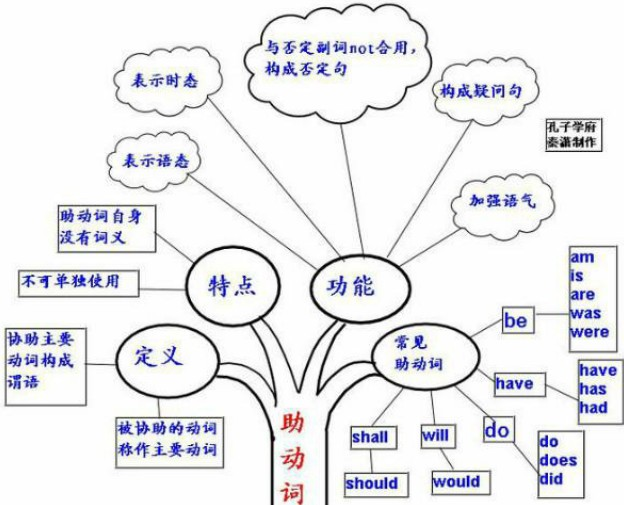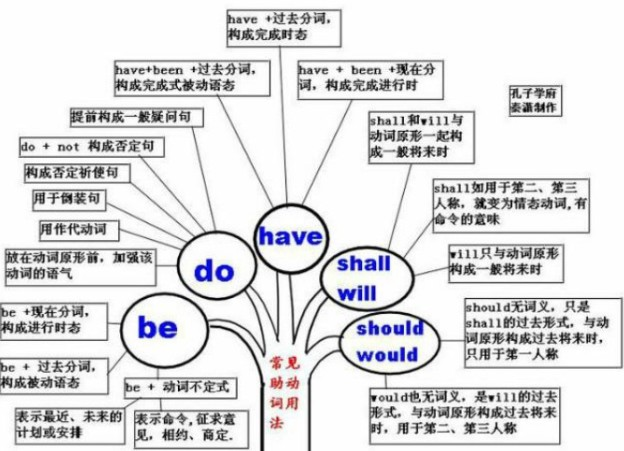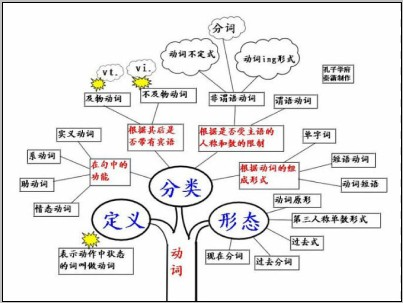本试题 “The coat _________me.[ ]A. isn't fitB. doesn't fitC. isn't fit toD. doesn't fit to” 主要考查您对助动词
动词
等考点的理解。关于这些考点您可以点击下面的选项卡查看详细档案。
- 助动词
- 动词
助动词的概念:
助动词是帮助主要动词构成各种时态,语态,语气以及否定或疑问结构的动词。助动词分为时态助动词和结构助动词两种。
助动词的用法:
1、助动词be的用法:
1)be+现在分词,构成进行时态。
例如:They are having a meeting. 他们正在开会。
English is becoming more and more important. 英语现在越来越重要。
2)be+过去分词,构成被动语态。
例如:The window was broken by Tom. 窗户是汤姆打碎的。
English is taught through out the world. 世界各地都教英语。
3)be+动词不定式,可表示下列内容:
a. 表示最近、未来的计划或安排。
例如:He is to go to NewYork next week. 他下周要去纽约。
We are to teach the freshmen. 我们要教新生。
说明:这种用法也可以说成是一种将来时态表达法。
b. 表示命令。
例如:You are to explain this. 对此你要做出解释。
He is to come to the office this afternoon. 要他今天下午来办公室。
c. 征求意见。
例如:How am I to answer him? 我该怎样答复他?
Who is to go there? 谁该去那儿呢?
d. 表示相约、商定。
例如:We are to meet at the schoolgate at seven tomorrow morning. 我们明天早晨7点在校门口集合。
2、助动词have的用法:
1)have+过去分词,构成完成时态。
例如:He has left for London. 他已去了伦敦。
By the end of last month, they had finished half of their work. 上月未为止,他们已经完成工作的一半。
2)have+been+现在分词,构成完成进行时。
例如:I have been studying English for ten years. 我一直在学英语,已达十年之久。
3)have+been+过去分词,构成完成式被动语态。
例如:English has been taught in China for many years. 中国教英语已经多年。
3、助动词do的用法:
1)构成一般疑问句。
例如:Do you want to pass the CET? 你想通过大学英语测试吗?
Did you study German? 你们学过德语吗?
2)do+not构成否定句。
例如:I do not want to be criticized. 我不想挨批评。
He doesn't like to study. 他不想学习。
In the past, many students did not know the importance of English. 过去,好多学生不知道英语的重要性。
3)构成否定祈使句。
例如:Don't go there. 不要去那里。
Don't be so absent-minded. 不要这么心不在焉。
说明:构成否定祈使句只用do,不用did和does。
4)放在动词原形前,加强该动词的语气。
例如:Do come to my birthday party. 一定来参加我的生日宴会。
I did go there. 我确实去那儿了。
I do miss you. 我确实想你。
5)用于倒装句。
例如:Never did I hear of such a thing. 我从未听说过这样的事情。
Only when we begin our college life do we realize the importance of English. 进了大学以后,我们才认识到英语的重要性。
说明:引导此类倒装句的副词有never, seldom, rarely, little, only, so, well等。
6)用作代动词。
例如:—Do you like Beijing? 你喜欢北京吗?
—Yes, I do. 是的,喜欢。(do用作代动词,代替like Beijing.)
He knows how to drive a car, doesn't he? 他知道如何开车,对吧?
4、助动词shall和will的用法:
shall和will作为助动词可以与动词原形一起构成一般将来时。
例如:I shall study harder at English. 我将更加努力地学习英语。
He will go to Shang hai. 他要去上海。
说明:在过去的语法中,语法学家说shall用于第一人称,will只用于第二、第三人称。现在,尤其是在口语中,will常用于第一人称,但shall只用于第一人称,如用于第二、第三人称,就失去助动词的意义,已变为情态动词。
试比较:He shall come. 他必须来。(shall有命令的意味。)
He will come. 他要来。(will只与动词原形构成一般将来时。)
5、助动词should,would的用法:
1)should无词义,只是shall的过去形式,与动词原形构成过去将来时,只用于第一人称。
例如:I telephoned him yesterday to ask what I should do next week. 我昨天给他打电话,问他我下周干什么。
比较:"What shall I do next week?" I asked. “我下周干什么?”我问道。
可以说,shall变成间接引语时,变成了should。
2)would也无词义,是will的过去形式,与动词原形构成过去将来时,用于第二、第三人称。
例如:He said he would come. 他说他要来。
比较:"I will go," he said. 他说:“我要去那儿。”变成间接引语,就成了He said he would come。原来的will变成would,go变成了come。
助动词知识体系:

常见的助动词用法解析:

动词的定义:
表示动作中状态的词叫做动词。根据其在句中的功能,动词可分为行为动词、系动词、助动词和情态动词四类,有些动词是兼类词。
例如:We have lunch at 12. (have是行为动词)
We have been to NewYork. (have是助动词)
I am hungry. (am是系动词)
You need not have waited for me. (need是情态动词)
The door needs painting. (need是兼类词)
动词的分类:
1)表示动作中状态的词叫做动词。
2)根据其在句中的功能,动词可分为四类,分别是:
实义动词(Notional Verb)、系动词(Link Verb)、助动词(Auxiliary Verb)、情态动词(Modal Verb)。
说明:有些情况下,有些动词是兼类词。
例如:We are having a meeting. 我们正在开会。(having是实义动词。)
He has gone to NewYork.他已去纽约。(has是助动词。)
3)动词根据其后是否带有宾语,可分为两类,分别是:
及物动词(Transitive Verb)、不及物动词(Intransitive Verb),缩写形式分别为vt.和vi.。
说明:同一动词有时可用作及物动词,有时可用作不及物动词。
例如:She can dance and sing. 她能唱歌又能跳舞。(sing在此用作不及物动词。)
She can sing many English songs. 她能唱好多首英文歌曲。(sing用作及物动词。)
4)根据是否受主语的人称和数的限制,可分两类,分别是:
限定动词(Finite Verb)、非限定动词(Non-finite Verb)。
例如:She sings very well. 她唱得很好。(sing受主语she的限制,故用第三人称单数形式sings。)
She wants to learn English well. 她想学好英语。(to learn不受主语she的限制,没有词形变化,是非限定动词。
说明:英语中共有三种非限定动词,分别是:动词不定式(Infinitive)、动名词(Gerund)、分词(Participle)。
5)根据动词的组成形式,可分为三类,分别是:
单字词(One-Word Verb)、短语动词(Phrasal Verb)、动词短语(Verbal Phrase)
例如:The English language contains many phrasal verbs and verbal phrases. 英语里有许多短语动词和动词短语。(contains是单字动词。)
Students should learn to look up new words in dictionaries. 学生们学会查字典。(look up是短语动词。)
The young ought to take care of the old. 年轻人应照料老人。(takecareof是动词短语。)
6)动词有五种形态,分别是:
原形(OriginalForm)、第三人称单数形式(Singular From in Third Personal)、过去式(Past Form)、过去分词(Past Participle)、现在分词(Present Participle)。
动词知识体系:

与“The coat _________me.[ ]A. isn't fitB. doesn't fitC. isn'...”考查相似的试题有:
- The first textbooks written for teaching English as a foreign language__________in the 16thcentury.A.came aboutB.ca...
- I'm sorry, but I didn't mean to keep you waiting here for a long time. Can you______ me?[ ]A. forgiveB. satisfyC. apo...
- As a laid-off worker, it is hard for her father to ______ the family, let alone send his children to keyschools.[ ]A....
- — Would you please tell us something about the Group of Eight?— Well, the G8 is an international organization ______ ...
- Featuressuch as height, weight, and skin colour____ from individual to individual and from face to face.[ ]A. changeB...
- After they married, they decided to move back to the village and _______.A.bring downB.calm downC.put downD.settl...
- How long did it them to go there by bus?A.payB.takeC.spendD.keep
- Whom would you rather ______ the washing, Nancy or Rose?[ ]A. have doB. doC. have hadD. have done
- Over years, China’s Women’s Table Tennis Team is an excellent group. Now no team can_____it, whether in spirit or in ...
- --- Do you have any idea why the bus – drivers are on strike?--- As far as I know, they are ____a pay rise.A.calling...